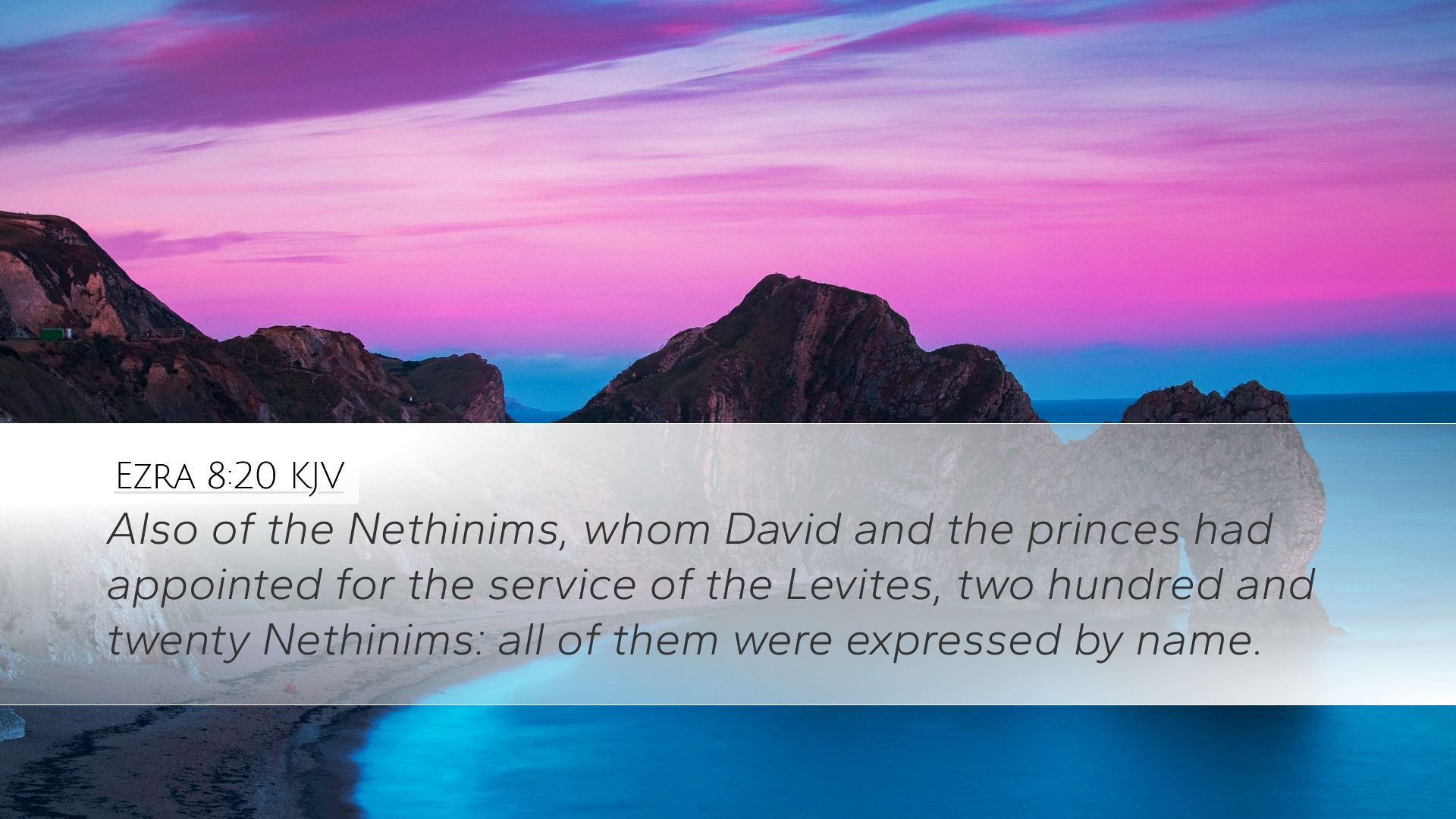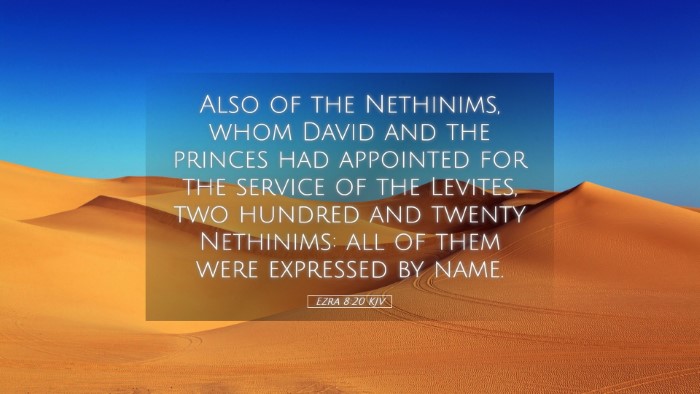Commentary on Ezra 8:20
Ezra 8:20 reads: "Also of the Nethinim, whom David and the princes had appointed for the service of the Levites, two hundred Nethinim; all of them were expressed by name." This verse is rich in meaning and historical context, warranting a thorough exploration of its implications for worship, service, and the organization of the community in ancient Israel.
Context and Overview
The return from Babylonian exile and the rebuilding of Jerusalem are central themes in the Book of Ezra. Chapter 8 specifically details the preparations and the organization of those who returned under Ezra's leadership. This particular verse highlights the inclusion of the Nethinim, individuals set apart for specific religious tasks, and emphasizes the need for dedicated service in ministry.
The Nethinim: Their Role and Significance
The term Nethinim is of particular significance. Derived from the Hebrew root meaning "to give," it indicates those who were given for service, particularly in connection with the temple. In their historical context, they were temple servants, often regarded as assistants to the Levites.
- Matthew Henry's Commentary: Henry reflects on the distinction between the Nethinim and the Levites, noting that the former were specifically appointed for the service of the latter. Their role was essential in ensuring the smooth operation of temple worship, indicating that every member of the community had a role in God's service.
- Albert Barnes' Commentary: Barnes emphasizes the historical appointment of these individuals by King David, suggesting that the establishment of their roles was divinely ordained. This appointment not only reflects God's long-term plan for the Israelite community but also serves as an example of structured leadership in worship.
- Adam Clarke's Commentary: Clarke focuses on the name's significance. He notes that being "expressed by name" indicates a recognition of each individual’s importance within the community, thereby underscoring the value placed on personal commitment and accountability in serving God's purposes.
The Importance of Organization in Ministry
This verse illustrates a crucial aspect of ministry: the need for organization and delineation of roles. Ezra's careful arrangement of personnel reflects a commitment to order and reverence in worship. It serves to remind modern readers that ministry requires structure and that every role, from the most visible to the least, contributes to the overall mission.
Theological Implications
- Service to God: Each individual’s role, whether as a Levite or a Nethinim, serves as a reminder that all believers are called to serve God in various capacities. The diversity of roles within the worshiping community highlights that every contribution is valuable and needed.
- Community and Belonging: The community of faith is portrayed as one body with many members (1 Corinthians 12:12-27). Each individual's assignment in Ezra's time mirrors the New Testament teaching that believers are interconnected and must work together to fulfill God’s mission.
- Historical Faithfulness: The reference to David’s appointment of the Nethinim provides a historical continuity that affirms God’s guiding hand over Israel throughout their tumultuous history. It demonstrates that the faithfulness of past leaders has lasting implications for worship practices today.
Practical Applications for Today
In a contemporary context, Ezra 8:20 challenges pastors, theologians, and church leaders to reflect on the structure and organization of their ministries. It prompts the following considerations:
1. Recognition of Roles
Understanding and acknowledging the diverse roles within the church is essential. Every role, regardless of its visibility, contributes to the holistic functioning of the church.
2. Commit to Service
Ezra's dedication in organizing the Nethinim can inspire today's leaders to ensure that all who commit to service are equipped, appreciated, and held accountable in their responsibilities.
3. Maintain Historical Context
Just as Ezra recognized the historical importance of the Nethinim, church leaders should respect and learn from the historical practices of the faith, adapting them thoughtfully to guide modern worship.
Conclusion
Ezra 8:20 serves as a vital reminder of the importance of organization in ministry and the recognition of each member's unique contribution to God's work. Drawing from the insights of esteemed public domain commentaries, we can appreciate the layers of meaning within this verse and apply them meaningfully within our own communities of faith.


